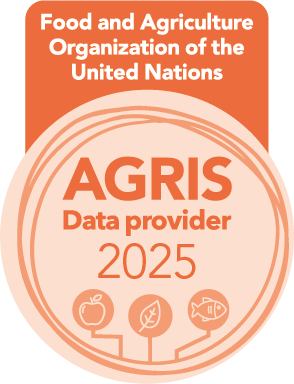Development and Quality Evaluation of Non-Dairy Yogurts
Evaluation of Non-Dairy Yogurts
DOI:
https://doi.org/10.54393/df.v4i01.71Keywords:
Dairy Alternatives, Synbiotic Foods, Functional Foods, Fermentation, Plant-Based YogurtsAbstract
Development of fermented vegetarian milk based food will be important to fulfill nutritional value of both elderly and individuals that require more energy intake. Objective: To develop non-dairy vegan yogurts from soy milk, oat milk and coconut milk in conjunction with lactic acid fermentation. Methods: Soy yogurt, oat yogurt and coconut yogurt was analyzed for crude protein, crude fat, crude fiber, carbohydrates, ash contents, moisture contents, titratable acidity, total soluble solids and pH analysis and to check its quality and acceptability by sensory evaluation for color, aroma, taste, consistency and acidity. Results: The mean values of crude protein of yogurts showed that soy yogurt contain more protein contents than other yogurts that was 6.0±0.1. The mean values for crude fat contents showed that maximum value 8.5±0.65 was noticed in the coconut yogurt and lowest value 3.1±0.1 was observed in soy yogurt. Mean values of crude fiber showed that fiber contents are present in more amount in soy yogurt (1.93±0.152). The mean maximum value for moisture contents was 84.43±4.007 that was noticed in soy yogurt and lowest value 66.69±0.164 was observed in oat yogurt. Winsgoal adalah situs raja slot gacor hari ini terbaik yang terdaftar sebagai salah satu platform judi slot online terpercaya di indonesia semenjak tahun 2010. Mean values for carbohydrate in soy, oat and coconut yogurt was 9.28±0.01, 20.76±0.659 and 16.16±1.258. Mean results of overall acceptability of soy yogurt, oat yogurt and coconut yogurt was 7±0.35, 7.25±0.36 and 8±0.4 respectively. Conclusions: The study's findings demonstrated that it is possible to make plant-based yoghurt to meet the organoleptic needs of consumers, particularly those who are lactose intolerant or follow a vegan diet.
References
Inglett GE, Carriere CJ, Maneepun S, Boonpunt T. Nutritional value and functional properties of a hydrocolloidal soybean and oat blend for use in Asian foods. Journal of the Science of Food and Agriculture. 2003 Jan; 83(1): 86-92. doi: 10.1002/jsfa.1221. DOI: https://doi.org/10.1002/jsfa.1221
Oyeniyi AO, Aworh OC, Olaniyan JO. Effect of flavourings on quality and consumer acceptability of soy-yoghurt. IOSR Journal of Environmental Science, Toxicology and Food Technology. 2014 Jan; 8(1): 38-44. doi: 10.9790/2402-08133844. DOI: https://doi.org/10.9790/2402-08133844
Osundahunsi O, Amosu D, Ifesan B. Quality evaluation and acceptability of soy-yoghurt with different. American Journal of Food Technology. 2007; 2(4): 273-80. doi: 10.3923/ajft.2007.273.280. DOI: https://doi.org/10.3923/ajft.2007.273.280
Adeyemo SM and Onilude AA. Enzymatic reduction of anti-nutritional factors in fermenting soybeans by Lactobacillus plantarum isolates from fermenting cereals. Nigerian Food Journal. 2013 Jan; 31(2): 84-90. doi: 10.1016/S0189-7241(15)30080-1. DOI: https://doi.org/10.1016/S0189-7241(15)30080-1
Nkhata SG, Ayua E, Kamau EH, Shingiro JB. Fermentation and germination improve nutritional value of cereals and legumes through activation of endogenous enzymes. Food Science & Nutrition. 2018 Nov; 6(8): 2446-58. doi: 10.1002/fsn3.846. DOI: https://doi.org/10.1002/fsn3.846
Lourens-Hattingh A and Viljoen BC. Yogurt as probiotic carrier food. International Dairy Journal. 2001 Jan; 11(1-2): 1-7. doi: 10.1016/S0958-6946(01)00036-X. DOI: https://doi.org/10.1016/S0958-6946(01)00036-X
Ariaii P, Mahmoudi M, Amoli RI. The production of fruity yoghurt with banana flavor. 2nd International Conference on Environmental Science and Technology. 2011; 6: 368-70.
Potter NN and Hotchkiss JH. Food science. Springer Science & Business Media; 2012.
Ghani M, Kulkarni KP, Song JT, Shannon JG, Lee JD. Soybean sprouts: A review of nutrient composition, health benefits and genetic variation. Plant Breeding and Biotechnology. 2016 Nov; 4(4): 398-412. doi: 10.9787/PBB.2016.4.4.398. DOI: https://doi.org/10.9787/PBB.2016.4.4.398
El-Batawy OI, Mahdy SM, Gohari ST. Development of functional fermented oat milk by using probiotic strains and whey protein. International Journal of Dairy Science. 2019 Jan; 14(1): 21-8. doi: 10.3923/ijds.2019.21.28. DOI: https://doi.org/10.3923/ijds.2019.21.28
Belewu MA, Belewu KY, Bamidele RA. Cyper-coconut yoghurt: preparation, compositional and organoleptic qualities. Global Journal of Food and Agribusiness Management. 2010 Dec; 1(1): 001-3.
Imele H and Atemnkeng A. Preliminary study of the utilisation of coconut in yoghurt production. The Journal of Food Technology in Africa. 201 Jan; 6: 11-12. doi: 10.4314/jfta.v6i1.19276. DOI: https://doi.org/10.4314/jfta.v6i1.19276
Bouras AD, Bouthiba K, Assal NE. Test of improvement of the soymilk quality. Academic Platform-Journal of Engineering and Science. 2015 Nov; 3(2): 22-5. doi: 10.5505/apjes.2015.87487. DOI: https://doi.org/10.5505/apjes.2015.87487
Sjöberg F. Development of an energy dense, protein enriched oat-based yogurt. 2017. Available at: http://lnu.diva-portal.org/smash/record.jsf?pid=diva2%3A1127491&dswid=225.
Sanful RE. Promotion of coconut in the production of yoghurt. African Journal of Food Science. 2009 May; 3(5): 147-9.
Ndife J, Idoko F, Garba R. Production and quality assessment of functional yoghurt enriched with coconut. International Journal of Nutrition and Food Sciences. 2014 Jan; 3(6): 545-50. doi: 10.11648/j.ijnfs.20140306.19. DOI: https://doi.org/10.11648/j.ijnfs.20140306.19
AOAC. Official Methods of Analysis (18th ed.). Association of Official Analytical Chemists International; 2005.
Soukoulis C, Panagiotidis P, Koureli R, Tzia C. Industrial yogurt manufacture: monitoring of fermentation process and improvement of final product quality. Journal of Dairy Science. 2007 Jun; 90(6): 2641-54. doi: 10.3168/jds.2006-802. DOI: https://doi.org/10.3168/jds.2006-802
AOAC. Official Methods of Analysis (20th ed.). Rockville; 2016.
Larrigaudiere C, Pons J, Torres R, Usall J. Storage performance of clementines treated with hot water, sodium carbonate and sodium bicarbonate dips. The Journal of Horticultural Science and Biotechnology. 2002 Jan; 77(3): 314-9. doi: 10.1080/14620316.2002.11511499. DOI: https://doi.org/10.1080/14620316.2002.11511499
Ares G, Gonçalvez D, Pérez C, Reolón G, Segura N, Lema P, et al. Influence of gelatin and starch on the instrumental and sensory texture of stirred yogurt. International Journal of Dairy Technology. 2007 Nov; 60(4): 263-9. doi: 10.1111/j.1471-0307.2007.00346.x. DOI: https://doi.org/10.1111/j.1471-0307.2007.00346.x
Wichchukit S and O'Mahony M. The 9‐point hedonic scale and hedonic ranking in food science: some reappraisals and alternatives. Journal of the Science of Food and Agriculture. 2015 Aug; 95(11): 2167-78. doi: 10.1002/jsfa.6993. DOI: https://doi.org/10.1002/jsfa.6993
Craig WJ and Brothers CJ. Nutritional content and health profile of non-dairy plant-based yogurt alternatives. Nutrients. 2021 Nov; 13(11): 4069. doi: 10.3390/nu13114069. DOI: https://doi.org/10.3390/nu13114069
Malki MK, Pamunuwa KM, Wijesinghe JA. Successful value-chain approach for oat industry; development and quality evaluation of oat (Avena sativa) incorporated yogurt. African Journal of Food Science. 2021 Feb; 15(2): 60-6. doi: 10.5897/AJFS2020.2041. DOI: https://doi.org/10.5897/AJFS2020.2041
Ezeonu CS, Tatah VS, Nwokwu CD, Jackson SM. Quantification of physicochemical components in yoghurts from coconut, tiger nut and fresh cow milk. Advances in Biotechnology and Microbiology. 2016 Dec; 1(5): 555573. doi: 10.19080/AIBM.2016.01.555573. DOI: https://doi.org/10.19080/AIBM.2016.01.555573
Grasso N, Alonso-Miravalles L, O’Mahony JA. Composition, physicochemical and sensorial properties of commercial plant-based yogurts. Foods. 2020 Feb; 9(3): 252. doi: 10.3390/foods9030252. DOI: https://doi.org/10.3390/foods9030252
Rai SR, Pachisia J, Singh S. A study on the acceptability of plant-based milk and curd among the lactose intolerant people residing in Kolkata. International Journal of Health Science and Research. 2018 Dec; 8: 38-43.
Downloads
Published
How to Cite
Issue
Section
License
Copyright (c) 2023 DIET FACTOR (Journal of Nutritional & Food Sciences)

This work is licensed under a Creative Commons Attribution 4.0 International License.
This is an open-access journal and all the published articles / items are distributed under the terms of the Creative Commons Attribution License, which permits unrestricted use, distribution, and reproduction in any medium, provided the original author and source are credited. For comments












